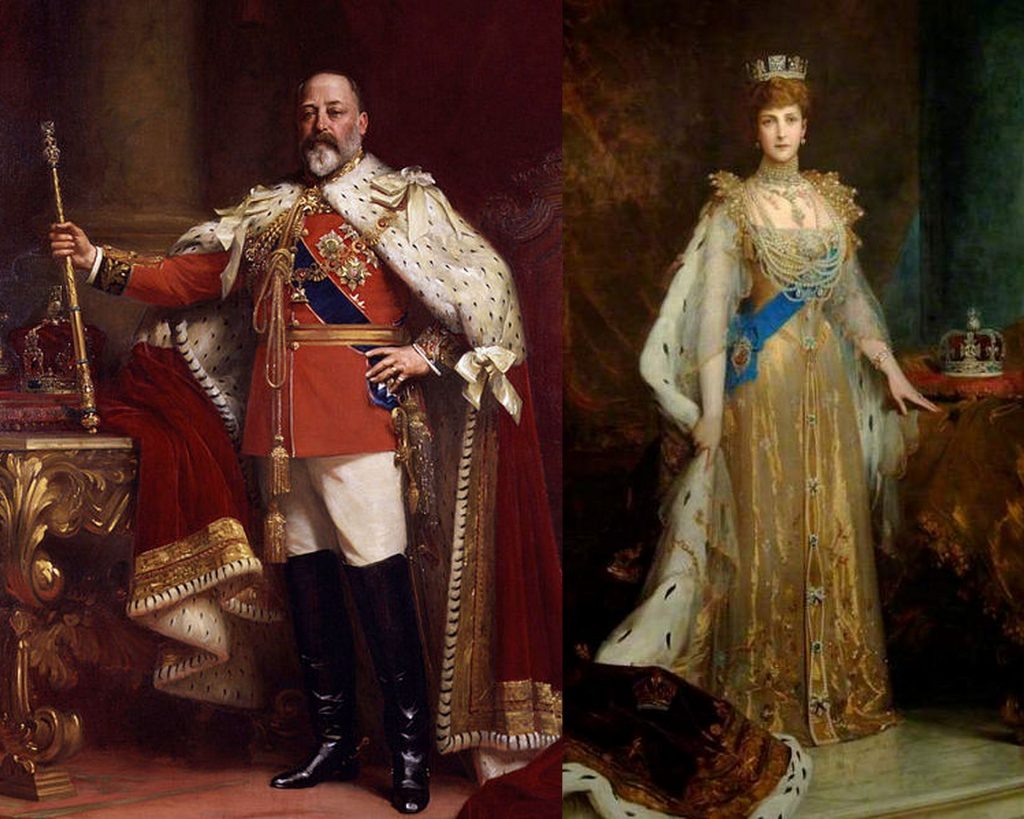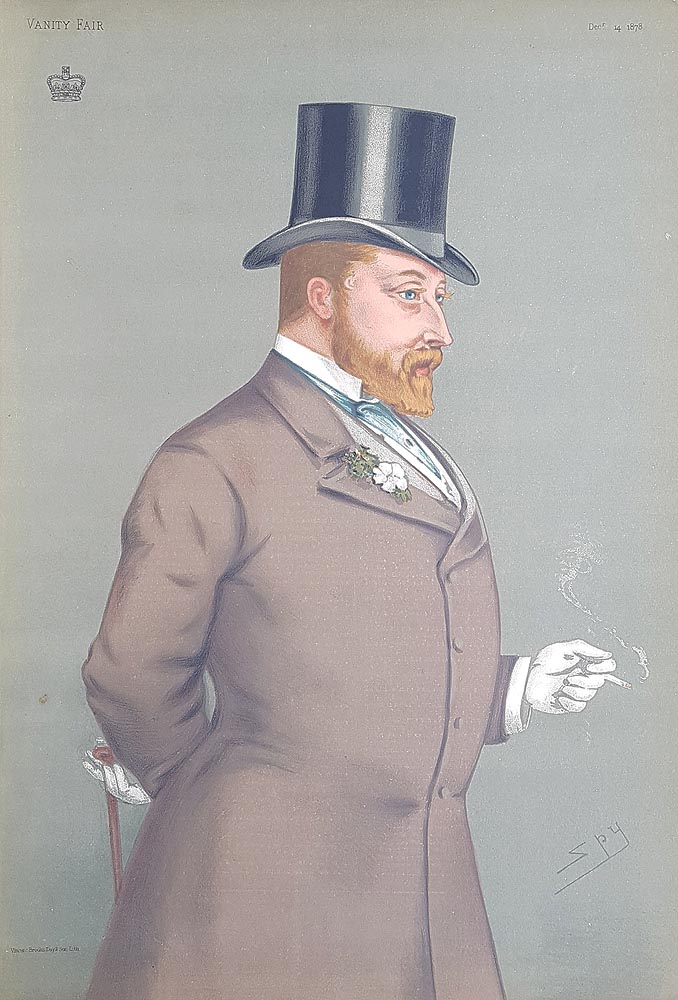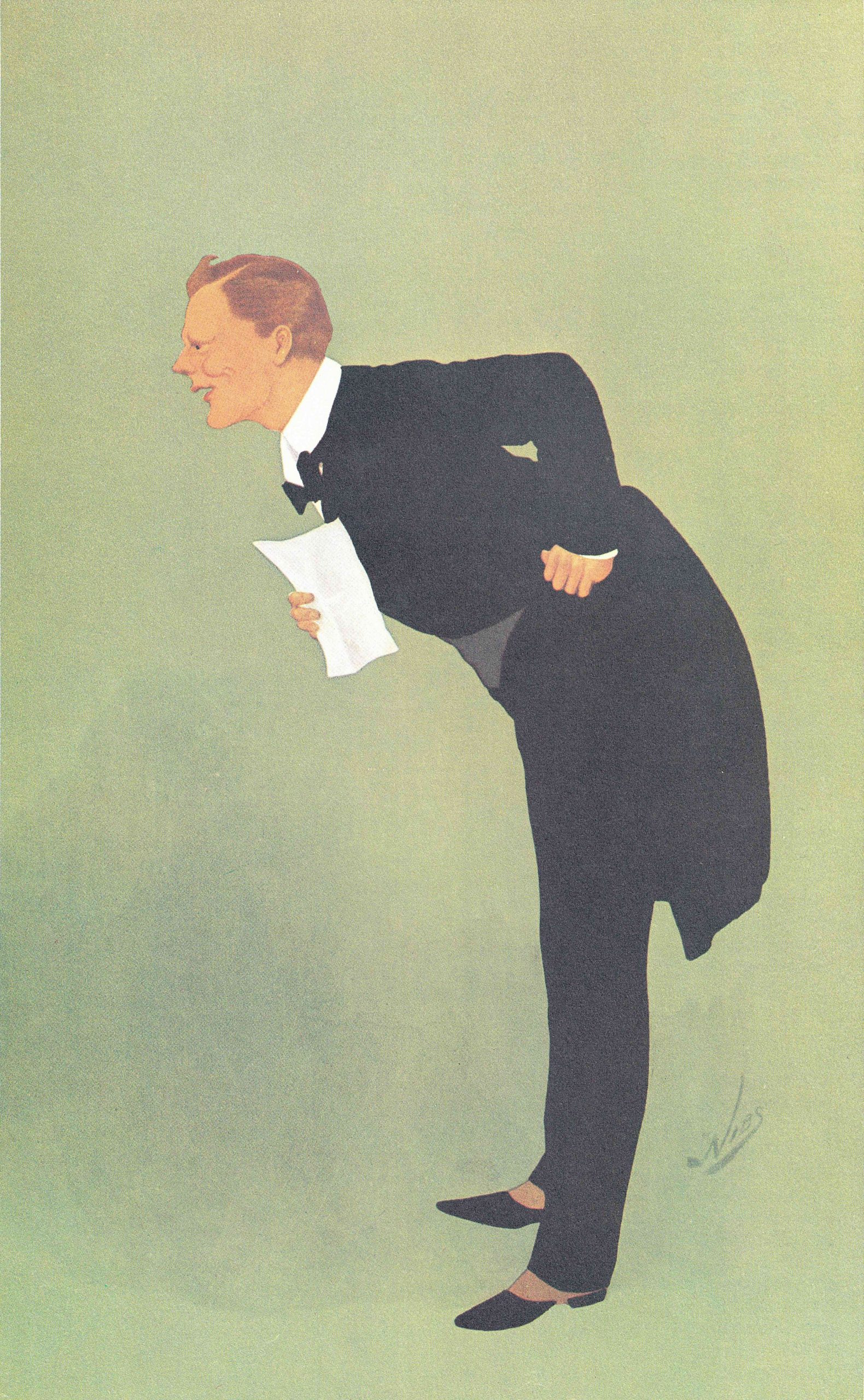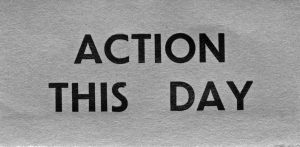
Finest Hour 184
The Cosmopolitan King: Edward VII

Edward VII and Queen Alexandra coronation portraits, 1901
July 29, 2019
Finest Hour 184, Second Quarter 2019
Page 10
By Fred Glueckstein
Fred Glueckstein is a regular contributor to Finest Hour and author of Churchill and Colonist II (2015).
Following his lecture tours in the United States in 1900, Winston Churchill continued his speaking engagements in Canada. During his last lectures in Winnipeg, Churchill learned of the death of Queen Victoria, which had occurred on Tuesday, 22 January 1901. He knew that Victoria’s son Albert Edward, the Prince of Wales, ascended the throne and chose to reign under the name Edward VII.
On learning of the Queen’s passing, Churchill wrote his mother: “I contemplated sending a letter of condolence and congratulations mixed, but I am uncertain how to address it and also whether such procedure would be etiquette. You must tell me. I am most interested and feel rather vulgar about the matter. I should like to know an Emperor and a King. Edward the VIIth—gadzooks what a long way that seems to take one back! I am glad he has got his innings at last, and am most interested to watch how he plays it.”1 Churchill’s remarks to his mother referred to two matters regarding the new King.

2024 International Churchill Conference
The first related to events in 1876 when Winston was only a year old. His father, Lord Randolph, had had a quarrel with the Prince of Wales that led to the exile of the Churchills to Dublin for three years. The dispute involved Randolph’s brother, the Marquess of Blandford, who had had an affair with the Countess of Aylesford. The Prince of Wales condemned Blandford as “the greatest blackguard/ rabble alive.” Randolph tried to defend his brother by attempting to blackmail the Prince of Wales, threatening to reveal His Royal Highness’s own affair with the Countess of Aylesford.
Prime Minister Benjamin Disraeli defused the growing crisis by sending Randolph’s father the Duke of Marlborough to Ireland to serve as the new Viceroy with Randolph in tow as his private secretary. Thus it was partly due to the actions of the future King Edward VII that young Winston’s earliest memories were of living in Ireland. On 4 February 1880, Winston’s brother Jack was born in Dublin. Later that year, after the dispute between the Churchills and the Prince of Wales had calmed down, Randolph and family returned to England. A complete reconciliation with the Prince of Wales occurred some years later.
The second of Churchill’s comments to his mother, that the new King had “got his innings at last,” referred to the Prince of Wales having held his title as heir apparent longer than any of his predecessors (fifty-nine years) before succeeding to the throne after the passing of his mother Queen Victoria—a record now surpassed by the present Prince of Wales, Charles.
Churchill at Balmoral
When Edward VII became King, Churchill was a Conservative MP for Oldham, one of the few two-member constituencies remaining in 1900. On 14 February 1901, the new King opened Parliament for the first time in his reign. In the Speech from the Throne, Edward VII spoke of the war in South Africa from which Churchill had just emerged.

The coronation of Edward VII and Queen Alexandra took place at Westminster Abbey on 9 August 1902. Originally scheduled for 26 June, the ceremony was postponed because the King was diagnosed with appendicitis. While in Scotland in 1902 visiting the Duke of Sutherland and Lord Rosebery, Churchill was asked to come to the King’s royal residence at Balmoral in Aberdeenshire.
On 27 September 1902, Churchill wrote to Lady Randolph from Balmoral: “Dearest Mamma, I have been vy kindly treated here by the King, who has gone out of his way to be nice to me. It has been most pleasant & easy going & today the stalking was excellent, tho I missed my stags. You will see the King on Weds when he comes to Invercauld; mind you gush to him about my having written to you saying how much etc etc I had enjoyed myself here.”2 In Churchill’s official biography, his son Randolph wrote of his father’s stay at Balmoral: “This visit was a signal honour for a young member of 27 who had been less than two years in the House of Commons.”3
In 1902, seven years after Lord Randolph Churchill’s passing, Winston was entrusted by his father’s literary executors to write an account of his father’s life. Copies of the manuscript Lord Randolph Churchill were sent to interested parties for their comments. Churchill sought and obtained permission from the King to publish letters, which passed between Lord Randolph and Queen Victoria and Lord Randolph and the Duke of Connaught.
The Peacemaker
Churchill recognized King Edward VII’s principal interests were in national and foreign affairs. In national matters, the King played a role in the modernization of the British Home Fleet and the reorganization of the British Army after the Second Boer War. In foreign affairs Edward VII, who was fluent in French and German, embarked on royal diplomacy through numerous state visits across Europe.
During travels to the continent, Edward VII visited King Carlos of Portugal and, then went on to Rome, where he visited the King of Italy and the Pope, as well as the Emperor of Austria and the Tsar of Russia. In May 1903, the King took one of his most important foreign trips: an official visit to France as the guest of President Émile Loubet. King Edward VII’s visit helped create the atmosphere for the Anglo-French Entente Cordiale, an agreement delineating British and French colonies in North Africa and ruling out any future war between the two countries.
The Entente Cordiale ended centuries of Anglo- French rivalry and Britain’s isolation from Continental affairs. It also attempted to counterbalance the growing dominance of the German Empire and its ally Austria- Hungary. Edward VII’s many foreign endeavors to prevent hostilities led to him being titled “the Peacemaker.”
Angry with Churchill
On 31 May 1904, Churchill crossed the floor from the Conservative Party and took his seat with the opposition Liberals. In February 1905, he gave a speech in the House of Commons on the Supplementary Army Estimates (budget changes). He spoke of “those gorgeous & gilded functionaries with brass hats and ornamental duties who multiply so luxurious on the plains of Aldershot and Salisbury.”The King condemned Churchill’s phrase “those gorgeous & gilded functionaries with brass hats.” “What good words for a recent subaltern of Hussars!” said the angry King.4

In December 1905, the Liberals took power and Lord Elgin was appointed Secretary of State for the Colonies by Prime Minister Henry Campbell-Bannerman. On 13 December, Churchill was chosen as Under-Secretary of State for the Colonies. Lord Elgin represented the Government in the House of Lords and Churchill in the House of Commons.
In 1906, the King was once again less than pleased with Churchill. The trouble stemmed from a debate in the House to censure Lord Milner as High Commissioner of South Africa and Governor of the Transvaal for authorizing the flogging of Chinese laborers in breach of the law. The threat of censure was founded on Milner’s violation of treaty obligations, and done without the knowledge or agreement of the Secretary of State for the Colonies. Churchill did not support Milner’s censure, as he believed the action should be condemned but not the individual.
During the debate, Churchill maintained his belief in not censuring Milner directly by employing the following approach in his speech: “I have carefully refrained from passing either censure or eulogy on all or any of these events, not because I am without opinions which at other times I may think or have thought it proper to express—I think with sufficient clearness—but because I think it would be impossible for us to do justice to his conduct either in the one direction or the other within the compass of a three hours debate.”5
Writing of his father, Randolph Churchill described what occurred next: “And then there followed a passage which for some reason, despite its ostensible fairness to Milner, probably gave more offence to Milner’s friends and supporters than anything Churchill had said or done before.”
Churchill said: “Lord Milner has gone from South Africa, probably forever. The public service knows him no more. Having exercised great authority he now exerts none. Having held high employment he now has no employment. Having disposed of events which have shaped the course of history, he is now unable to deflect in the smallest degree the policy of the day. Having been for many years, at any event for many months, the arbiter of the fortune of men who are ‘rich beyond the dreams of avarice’ he is today poor, and I will add honourably poor.” “After twenty years of exhausting service under the Crown he is today a retired Civil Servant, without pension or gratuity of any kind whatever,” said Churchill.6 It should be noted that Churchill had already used the loose phrase “honourable poverty” in his memorandum to the Cabinet on 30 January.
Misinterpreting his words and intent on Milner’s behalf, many people were upset with Churchill, includng his relative Lady Londonberry, who wrote the King of her dismay. Edward replied to her from Biarritz: “I share your views concerning certain proceedings in the House of Commons, and the conduct of a certain relation of yours is simply scandalous. It is indeed hard on Lord Milner to be treated in such a manner. Alas! Nowadays Party comes before country!”7
The King also wrote to Lord Crewe in the Colonial Office: “It is a pity that Lord Elgin does not seem to be able to control the violent and objectionable language of his Parliamentary Under-Secretary. It has made a painful impression on most people.”8 In the end, censure against Milner did not pass the House of Commons. Churchill felt justified by his actions to prevent Milner’s censure but felt wronged by the personal criticism directed at him.
A Friendship Builds
In the years that followed, the association between the King and Churchill strengthened. In early 1907, Churchill spent time with the King and Queen in Biarritz. Upon his return to England, the King wrote a warm-hearted letter to Churchill. Dated 6 April 1907 from HM Yacht Victoria & Albert at Toulon, the letter read:
My dear Winston,
Many thanks for your kind letter which I received yesterday just before my departure from Biarritz.
I was very glad to have the opportunity of having several conversations with you on various interesting subjects.
It is quite true that we have known your parents for many years (even before their marriage) & you & your brother since childhood. Knowing the great abilities which you possess, I am watching your political career with great interest. My one wish is that the great qualities you possess may be turned to good account & that your services to the State may be appreciated.
Believe me,
Very sincerely yours,
Edward R9
On 8 April 1908, Churchill was appointed by the new Prime Minister, H. H. Asquith, to the Cabinet post of President of the Board of Trade, a government department concerned with commerce and industry. Churchill was thirty-three years of age. As a Minister of the Crown, Churchill had to go to Buckingham Palace to “kiss hands” on the appointment.
A few months later, became engaged to Clementine Hozier and received a telegram from the King:
14 August 1908
Marienbad
My dear Winston,
Many thanks for announcement to me your engagement to Miss Hozier & I offer you my best wishes for your happiness.
EDWARD R10
Churchill shared the King’s correspondence with Clementine. His note to her read in part: “My dearest & most truly beloved—I send you the King’s telegram wh I have dutifully answered….” Churchill and Clementine received numerous marriage gifts. Among them was a gold-headed Malacca walking cane from the King, which Churchill used for the remainder of his life.
In early August 1909, Churchill as President of the Board of Trade was at the center of an industrial arbitration in the coal industry, where a strike threatened to paralyze coal production. Over two days, Churchill participated in twenty hours of negotiation that resulted in a satisfactory settlement. The King sent Churchill his congratulations.
Home Secretary and the King
On 14 February 1910, Churchill was moved by Asquith to the Home Office. In addition to being Prime Minister, Asquith was leader of the House. On a number of occasions, Churchill was asked by Asquith to represent him and close some of the important debates.
Asquith also delegated to Churchill the task of writing the nightly letter to the King on the work of the House. Randolph Churchill wrote that his father “doubtless relished the task all the more because he was not Leader of the House of Commons, and it was therefore a tribute both to his sense of the House of Commons and to his literary style that the job came his way.”11
As Home Secretary, Churchill was involved in a wide gamut of social matters, which included prisons and prisoners, the police, and signing death sentences. He was also responsible for the working conditions of seven million people in shops, factories, workshops, and one million others in the mines.
During that time, Churchill was confronted by the continuing challenge of the House of Lords against Liberal social reforms. In a speech at Manchester on 17 March 1910, he publicly advocated “The Crown and Commons acting together against the encroachments of the Lords.” The King, who was at Biarritz, was troubled by Churchill’s speech. Sir Frederick Ponsonby, Edward VII’s assistant private secretary, wrote of the King’s concerns to Lord Althorp, the Lord Chamberlain: “The King thinks that as I am writing to you privately I might mention the following matter. The somewhat nebulous allusions to the Crown in Winston Churchill’s speech seemed to have received various interpretations from various quarters, and it has been most distasteful for the King to find speeches, letters to the Press, and leading articles discussing the point and attributing various opinions to His Majesty,” wrote Ponsonby. He continued: “The King thinks that you might privately tell the PM that he hopes that as far as possible Cabinet Ministers will refrain from mentioning His Majesty’s name in their speeches or referring to him in their discussions.”12
On 6 May 1910, the nation learned that the King had died in Buckingham Palace. Edward VII had reigned for nine years and was buried at St. George’s Chapel, Windsor. On behalf of the House of Commons, Churchill wrote the letter of condolence to the new King, George V.
Churchill also wrote the draft of a Gracious Message for the King to be delivered to both houses of Parliament on 11 May 1910. In what must have been a challenging endeavor, the heartfelt draft message written by Churchill for King George V’s approval read:
The King knows that the House of {Lords / Commons} shares in the profound and sudden sorrow which has fallen upon His Majesty by the death of his Majesty’s father, the late King; and that the House entertains a true sense of the loss which His Majesty and the Nation have sustained from this mournful event.
King Edward’s care for the welfare of His Country and His people, His skilled and prudent guidance of affairs, His unwearying [unwavering] devotion to public duty during his illustrious reign, His simple courage in pain and danger, will be held in honour by His subjects at home and beyond the seas.13
Although King Edward VII did not always agree with Churchill, the two had a long affable association built on a relationship that began with Lord and Lady Randolph. During his early years as an MP and Minister of the Crown, Churchill admired King Edward VII’s many national and foreign accomplishments, particularly his determination to build a better understanding between the nations of Europe on behalf of world peace.
Endnotes
1. Randolph S. Churchill, The Churchill Documents, vol. II, Young Soldier, 1896–1901 (Hillsdale, MI: Hillsdale College Press, 2006), p. 1231.
2. Randolph S. Churchill, Winston S. Churchill, vol. II, Young Statesman, 1901–1914 (Hillsdale, MI: Hillsdale College Press, 2007), p. 52.
3. Ibid., p. 53.
4. Ibid., p. 94.
5. Ibid., p. 182.
6. Ibid., pp. 182–83.
7. Ibid., p. 185.
8. Ibid.
9. Ibid., p. 211.
10. Randolph S. Churchill, The Churchill Documents, vol. IV, Minister of the Crown, 1907–1911 (Hillsdale, MI: Hillsdale College Press, 2007), p. 803.
11. Young Statesman, p. 426.
12. Ibid., pp. 338–39.
13. Minister of the Crown, p. 1014.
Subscribe
WANT MORE?
Get the Churchill Bulletin delivered to your inbox once a month.




